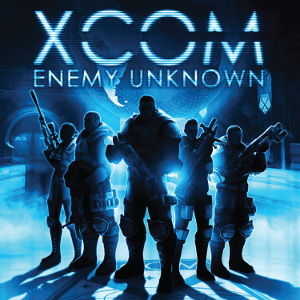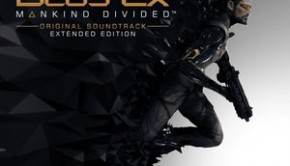XCOM -Enemy Unknown- Original Soundtrack
 |
Album Title: XCOM -Enemy Unknown- Original Soundtrack |
| Record Label: 2K Games |
|
| Catalog No.: N/A |
|
| Release Date: October 12, 2012 |
|
| Purchase: Not Available |
Overview
In 2012, Firaxis Games successfully revived the much-loved XCOM series with XCOM: Enemy Unknown, a cutting-edge reimagining of the original game in the series. Industry veteran Roland Rizzo — who has been working on franchises such as Civilization, Spy Hunter, and, of course, XCOM itself since 1983 — led the music and sound for the game. Though he handled the bulk of the ambient and diegetic tracks, he appointed Michael McCann (Deus Ex: Human Revolution, Splinter Cell: Double Agent) to compose the defining adventure tracks and Tim Wynn (The Darkness II, Command & Conquer: Red Alert 3) to score some cinematics. Those who purchased the special edition of the game were eligible to download the soundtrack. Together with the XCOM 2 soundtrack, the music will also be released on vinyl together later this year. How does it stack up?
Body
Fans of the Deus Ex: Human Revolution soundtrack will be delighted to learn that Michael McCann wrote a similarly styled main theme for XCOM: Enemy Unknown. Introduced on the main menu screen, the composition gradually builds up atmosphere with ambient noise, soft synthpads, and haunting string sounds, leading to the introduction of the warm, synthy Vangelis-inspired main melody at the 1:28 mark. When stripped down, it is a simple and subtle track — to an even greater extent than his themes for his previous scores — yet the atmosphere it creates is incredible. He perfectly captures the semi-futuristic sci-fi style of the game, while setting a tense scene for the encounters between humans and aliens that will unfold. There are plenty of solid arrangements of the main theme during the soundtrack, notably “Ready for Battle”, “Mission Complete”, and “Vigilo Confido”, that enhance the continuity of the game experience while being differentiated enough to still be effective and appealing on their own.
The soundtrack is dominated by cinematic cues and event pieces that retell the story of the game. The majority of these tracks are brief and understated, since they were intended primarily for in-game underscoring rather than stand-alone listening. The military brass writing of “First Contact” and soothing electronics of “A Survivor Returns” — both one minute cues written by Wynn — bring humanity to the score while having a cinematic undercurrent. Others such as McCann’s “Interception” and “Terror Upon Us” reflect the alien invasion with eerie sounds. The former is a brutally efficient way to underscore a tense encounter — a 15 second loop of rumbling percussion and dissonant shrieks. The latter undergoes a more pronounced development and build-up, but would have benefited from more development. These tracks serve as passable underscore, but generally are too short or sparse to appeal otherwise.
A number of the pieces on the soundtrack even blur the boundaries between music and noise. Rizzo’s tracks on the main soundtrack are about as ambient as they come, especially “Hidden Movement” and “Otherworldly Dissonance”; these tracks each comprise four minutes of ambient drones, distorted electronics, and heavy reverb. Most will find these tracks unpleasant or boring on the soundtrack release, since there are no conventional melodies or structures to speak of. Yet they’re enormously effective in context, where they create a truly unsettling and alien feel. The mission control theme “The Fate of the Earth” will be somewhat more rewarding for those with a taste of downtempo electronics. Towards the conclusion of the soundtrack, “Discovering the Gift” and “Depths of the Hive Mind” also feature a mixture of quiescient and horrifying segments, which are again only suitable for presentation in context.
There are nevertheless a number of tracks that are still rewarding on a stand-alone basis. The three headquarters tracks “Breaking Ground”, “The Alien Underbelly”, and “Arrival” further explore the soundtrack’s electronic sound, each more intense than the one before. The tracks featured at the climax of the soundtrack make up for the material that preceded and are among the composer’s very best. “End Game” raises the stakes with its emotional vocal work, combining dramatic operatic segments for mixed chorus with a tear jerking finale featuring children’s choir. “Alien Pact” is more reserved but equally effective, blending electronics and acoustics in a more tender, unifying way than the rest of the album. Falling slightly short of “Icarus”, the recapitulation of the main theme in “Our Last Hope” is nevertheless a strong closer. McCann combines the electronic sounds of its exposition with McCann’s signature orchestral and choral writing to create a magnificent timbre.
Summary
It is difficult to question the sound direction and composition of XCOM: Enemy Unknown. After all, practically every component of the soundtrack works wonderfully in building the game’s atmosphere and drama, while staying faithful to the legacy of the series. In some ways, the somewhat low-key approach to the score’s production is refreshing in a day dominated by melodramatic, overblown scores. That said, the score doesn’t always satisfy as a stand-alone basis due to the abundance of brief cinematic cues and lengthy ambient underscore. The soundtrack that came with the special edition of the game gives a solid overview of the in-game soundtrack, despite the omission of the diegetic pieces. However, those who download the album may prefer to trim the soundtrack to leave just those tracks truly written for stand-alone listening. The highlights of the soundtrack, especially the variations of the main theme and the finale, nevertheless make it worthwhile.
Do you agree with the review and score? Let us know in the comments below!
3
Posted on April 18, 2016 by Chris Greening. Last modified on April 18, 2016.














